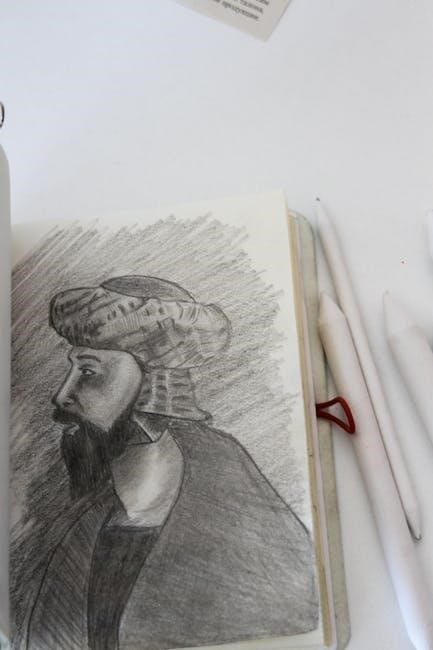Daniel Coyle’s The Talent Code reveals how talent is developed through myelin, deliberate practice, and passion. A must-read for coaches, parents, and educators seeking to nurture skills effectively.
1.1 Overview of the Book and Its Author
The Talent Code by Daniel Coyle explores how talent is cultivated through myelin, deliberate practice, and passion. Coyle, a journalist and bestselling author, reveals that talent is not innate but built. He identifies three key elements: deep practice, ignition, and coaching. Drawing on neurology and visits to talent hotbeds worldwide, Coyle offers insights for anyone seeking to enhance skills in sports, music, or education. This 246-page book is a guide for parents, teachers, and coaches to unlock human potential.
1.2 Key Concepts and Main Themes
The Talent Code revolves around three core concepts: deep practice, ignition, and coaching. Deep practice involves focused repetition to build myelin, enhancing skill development. Ignition refers to the spark that drives motivation and passion. Coaching provides guidance, essential for refining talent. These themes emphasize that talent is cultivated, not born, offering practical tools for anyone to improve performance in various fields, from sports to education, by understanding the science behind skill acquisition and dedication.
The Three Talent Boosters
Daniel Coyle identifies three key talent boosters: deep practice, ignition, and coaching. These elements work together to enhance skill development, drive passion, and refine expertise effectively in any field;
2.1 Deep Practice: The Role of Myelin in Skill Development
Deep practice is targeted, mistake-focused effort outside your comfort zone. It triggers the growth of myelin, a neural insulator that enhances signal speed and accuracy. Coyle explains that every skill, from music to sports, relies on myelin’s ability to wrap nerve fibers, making actions automatic and refined. This biological process is a cornerstone of talent development, proving that deliberate, slow, and focused repetition builds mastery over time.
2.2 Ignition: The Spark That Drives Passion and Motivation
Ignition is the emotional trigger that fuels passion and motivation. Coyle identifies revelatory moments—inspiring experiences or role models—as key catalysts. These moments create a belief in one’s potential, driving persistent effort. Ignition sustains motivation by linking personal identity to the skill, making the pursuit feel intrinsic and meaningful. Without this spark, even the most skilled practice may lack the necessary drive to achieve mastery, highlighting the importance of emotional connection in talent development.
2.3 Coaching: The Importance of Guidance in Talent Development
Coaching plays a pivotal role in talent development by providing targeted guidance and feedback. Effective coaches optimize practice, break skills into manageable parts, and offer timely corrections. They create an environment where learners can safely challenge themselves, fostering growth. Coyle emphasizes that skilled coaches accelerate progress by aligning practice with individual needs, ensuring each effort builds toward mastery. Their expertise and support are essential for transforming raw potential into exceptional performance across various fields.

The Science Behind Talent Development
The book explores how myelin, a brain substance, enhances skill development through deliberate practice. Coyle explains the neural mechanisms that strengthen connections, making skills automatic and refined.
3.1 The Role of Myelin in Building Skills
Daniel Coyle explains that myelin, a neural insulator, plays a crucial role in skill development. When we practice, myelin wraps around nerve fibers, speeding up neural signals. This process, called myelination, strengthens connections between neurons, making skills more automatic and refined. The thicker the myelin layer, the faster and more precise the neural pathways, leading to mastery. Coyle emphasizes that targeted practice outside one’s comfort zone accelerates this process, building expertise faster and more effectively than random or casual practice. This scientific insight is central to understanding how talent is cultivated.
3.2 Neurological Mechanisms That Enhance Performance
Daniel Coyle highlights how neurological mechanisms, particularly myelination, enhance performance by accelerating neural communication. When nerve fibers are repeatedly used, myelin insulation thickens, enabling faster and more precise signal transmission. This process, driven by focused practice, strengthens neural pathways, making skills more efficient and second nature. Over time, these enhanced pathways allow for smoother, quicker, and more accurate execution of tasks, ultimately elevating performance levels across various disciplines. Coyle’s insights reveal the biological foundation of skill mastery.

Practicing Effectively
Effective practice involves deliberate focus, pushing beyond comfort zones, and building myelin through repetition. This approach ensures skills are refined and neural pathways strengthened efficiently over time.
4.1 The Power of Deliberate Practice
Deliberate practice is a structured approach to skill-building, focusing on targeted, repetitive efforts outside one’s comfort zone. By breaking tasks into smaller parts and emphasizing slow, focused repetition, it ensures continuous improvement. Coyle emphasizes that this method, often used in talent hotbeds, builds myelin, reinforcing neural pathways and enhancing performance. It requires intense concentration and immediate feedback, making it a cornerstone of effective talent development across various fields.
4.2 How to Practice Outside Your Comfort Zone
Practicing outside your comfort zone involves engaging in challenging activities that push your current limits. Coyle highlights that this approach prevents complacency and accelerates skill development by forcing the brain to adapt. By targeting areas where you struggle, you build resilience and enhance myelin growth. This method, often used in talent hotbeds, ensures continuous improvement and fosters breakthroughs in performance, making it a key component of effective talent cultivation.
Igniting Passion and Motivation
Ignition sparks passion and motivation, driving individuals to pursue their talents. Revelatory moments inspire belief, fueling dedication and persistence in skill development.
5.1 The Role of Revelatory Moments in Talent Development
Revelatory moments are powerful experiences that ignite passion and belief, motivating individuals to pursue their talents. These moments, often inspired by observing others’ success, create a deep desire to excel. They spark a mindset shift, making individuals believe in their potential, which is crucial for sustained effort and resilience. Coyle emphasizes how such moments drive focused practice and long-term dedication, forming the emotional foundation for talent development.
5.2 How to Cultivate Long-Term Passion for a Skill
Cultivating long-term passion requires creating meaningful connections to the skill. Coyle suggests that setting clear, achievable goals and celebrating small successes fosters engagement. Surrounding oneself with supportive communities and mentors also sustains interest. Encouraging a growth mindset helps individuals view challenges as opportunities, rather than obstacles. By linking the skill to personal values and identity, passion becomes intrinsic, driving consistent effort and enjoyment over time. This approach ensures lasting dedication and continuous improvement;

The Role of Coaches and Mentors
Coaches and mentors play a vital role in talent development by providing personalized guidance, feedback, and support. They help refine skills and foster growth through focused practice.
6.1 How Coaches Can Optimize Talent Development
Coaches can optimize talent development by breaking skills into manageable parts, encouraging deliberate practice, and providing targeted feedback. They create an environment where learners feel safe to fail and improve. By understanding each individual’s needs, coaches tailor their approach to maximize growth. Effective communication and patience are key to fostering progress and building confidence in their students. This personalized guidance helps learners achieve their full potential.
6.2 The Importance of Feedback in Skill Acquisition
Feedback is a cornerstone of effective skill acquisition, serving as a guide for learners to refine their efforts. Immediate and precise feedback helps individuals identify strengths and areas for improvement, fostering faster progress. Coaches play a crucial role in delivering feedback that is both constructive and actionable. By highlighting specific aspects of performance, feedback accelerates the growth of myelin, the neural insulation critical for skill mastery. Regular, high-quality feedback ensures learners stay on track and continuously improve, making it indispensable in talent development.
Case Studies: Talent Hotbeds Around the World
Daniel Coyle examines remarkable talent hotbeds like a Russian tennis club and Brazilian soccer clubs, revealing how they produce elite athletes through focused practice and expert guidance.
7.1 Examples of Extraordinary Talent Development Programs
The Talent Code highlights remarkable talent hotbeds, such as a penniless Russian tennis club producing top players and Brazilian soccer clubs nurturing elite athletes. These programs emphasize deliberate practice, focused repetition, and expert guidance. Coyle also explores South Korean golf academies and British music schools, revealing how their structured approaches and passion-driven environments foster exceptional skill development. These examples illustrate how specific techniques, like slow practice and targeted feedback, accelerate talent growth and create world-class performers.
7.2 Lessons Learned from Successful Talent Hotbeds
Successful talent hotbeds share common traits: focused practice, expert coaching, and a supportive environment. They prioritize deliberate practice, where challenges are met with repetition to build skill. Coyle emphasizes the role of myelin in brain development, where consistent effort strengthens neural pathways. Additionally, these programs ignite passion through revelatory moments, showing learners their potential. Feedback is continuous, guiding improvement. These strategies, applied across various fields, demonstrate how talent can be systematically cultivated to achieve extraordinary results.

Applying the Talent Code in Various Fields
The Talent Code’s principles are versatile, applicable in sports, arts, music, and education. It helps build elite athletes, nurture creative talent, and enhance academic performance effectively.
8.1 Sports: Building Elite Athletes
Daniel Coyle’s insights highlight how sports talent is cultivated through deliberate practice and myelin growth. Athletes in talent hotbeds, like Russian tennis clubs, achieve excellence by focusing on targeted practice outside their comfort zones. Coaches play a vital role in providing precise feedback, accelerating skill development. The book emphasizes how passion, ignited by revelatory moments, sustains long-term dedication. These principles have been successfully applied to produce world-class athletes, proving talent development is a combination of science and intentional effort.
8.2 Arts and Music: Nurturing Creative Talent
Daniel Coyle’s book highlights how artistic and musical talent is cultivated through deep practice and myelin growth. Musicians, for instance, develop skills by repeating challenging passages slowly and deliberately. Ignition, often sparked by revelatory moments, fuels passion and dedication. Coaches and mentors play a crucial role in providing feedback and refining techniques. These principles, applied in talent hotbeds like Juilliard, demonstrate how intentional practice and guidance can nurture exceptional creative abilities, transforming raw potential into mastery.
8.3 Education: Enhancing Learning and Academic Performance
Daniel Coyle’s insights in The Talent Code apply powerfully to education, revealing how myelin growth enhances learning. By breaking skills into smaller parts and practicing deliberately, students build neural pathways. Ignition sparks curiosity, driving motivation. Teachers act as coaches, providing targeted feedback to refine abilities. This approach transforms classrooms into talent hotbeds, enabling students to master complex subjects like math or coding through focused effort and guided practice, fostering long-term academic success.
